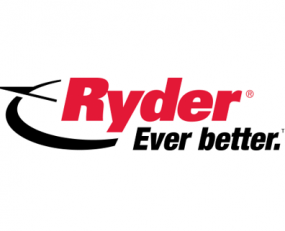
Ryder has reported its Q1 results for 2020, showing revenues down by 1% to $2.2bn, while operating revenue increased by 1% to $1.8bn. Operating revenues are reported to have been well ahead of management’s expectations through mid-March.
In the Fleet Management Solutions (FMS) business segment, total revenue was $1.3bn, down 1% from the year-earlier period. FMS operating revenue is $1.2bn, up 2% Y-o-Y. Ryder ChoiceLease revenue increased 7%, reflecting a larger average fleet size as well as higher prices on new vehicles. The lease fleet increased by 5,300 vehicles or 3% compared to the prior year. Commercial rental revenue decreased 13% from the year-earlier period due to lower demand, partially offset by higher pricing. Earnings were also negatively impacted by an estimated impact from COVID-19 of $60m, as well as lower commercial rental performance. These impacts were partially offset by higher ChoiceLease results, which benefited from fleet growth and higher pricing. Lower rental performance was driven by decreased demand, partially offset by increased pricing.
In the Supply Chain Solutions (SCS) business segment, total revenue was down 1% to $628m and operating revenue was down 2% to $467m compared with the year-earlier period. The decline in SCS total revenue and operating revenue primarily reflects previously announced lost business and COVID-19 related volume reductions in the automotive sector, partially offset by increased pricing and higher volumes with non-automotive customers.
SCS earnings before tax of $31m decreased 4% in Q1 2020 compared with $32m in 2019. This decrease reflects COVID-19 related automotive industry production shutdowns and currency valuation charges which together total approximately $10m, as well as additional impacts from prior-year insurance rebates and increased medical expenses. These impacts were mostly offset by higher pricing and increased volumes with non-automotive customers.
In the Dedicated Transportation Solutions (DTS) business segment, total revenue was down 4% to $335m and operating revenue slightly increased to $237m compared with the year-earlier period. The decline in DTS total revenue reflects lower subcontracted transportation revenue and lower fuel costs passed through to customers. DTS operating revenue growth reflects higher volumes and pricing, partially offset by lost business.
CEO Robert Sanchez said, “Through mid-March, first quarter results were well ahead of our prior expectations; however, the COVID-19 pandemic negatively impacted performance for the quarter. Although we cannot predict the depth and duration of the economic impact from COVID-19, we are focused on actions to mitigate the negative effect on our operations while continuing to serve our customers and position the company to achieve our long-term goals.”
Source: Ryder